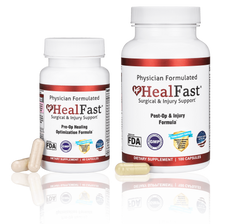

Why You Shouldn’t Skip Post-Op Follow-up Appointment (Even If You Feel Fine)

After surgery, it’s normal to focus on getting back to a normal life - resting well, eating right, and monitoring your body's recovery day by day. When the pain fades and your incision looks better, it’s easy to assume that your healing is complete.
But real recovery isn’t always visible from the outside. Your body continues to repair tissues, reduce internal swelling, and rebuild strength long after you start feeling “fine.” And sometimes, small complications can begin quietly beneath the surface - without obvious pain or warning signs.
There’s a lot more to understand about the importance of post-op check-ins. Let’s explore:
What Is a Post-Op Appointment?
A post-op appointment is a scheduled visit with your surgeon after your operation. Think of it as your recovery checkpoint, where your doctor evaluates how your body is healing inside and out.
Get Post-Surgical Healing Tips Here!
What Happens During a Post-Surgery Follow-Up Appointment?
Feeling unsure about what happens during a post-op visit is completely normal - but these appointments are usually quick, straightforward, and incredibly important for your recovery. Most take just 15–30 minutes, yet they give your surgeon vital insight into how your body is healing.
Here’s what typically happens during your check-in:
1. Vital Signs Check: Your surgeon will start by checking your temperature, blood pressure, and oxygen levels. These basic readings reveal a lot - even small changes can signal infection, dehydration, or stress on your body that needs attention.
2. Incision Site Review: Your surgeon will carefully inspect your surgical incision for any redness, unusual swelling, discharge, or separation of the wound. Catching these early helps prevent infections and ensures your incision is healing cleanly and evenly.

3. Drain or Suture Removal (if applicable): If your surgery involved drain tubes or stitches, they’re usually removed during one of your early follow-ups. This is done safely under sterile conditions to reduce infection risk and support smoother healing.
4. Progress and Recovery Discussion: You’ll talk with your surgeon about how you’re feeling - including pain levels, mobility, swelling, sleep quality, and emotional recovery. This conversation helps your provider tailor advice to your current stage of healing.
5. Medication and Nutrition Adjustments: As your body continues to heal, your doctor may adjust your medications and recommend nutritional or supplement support to promote tissue repair and reduce inflammation.
Healing nutrients like vitamin C, zinc, or protein supplements can often speed recovery.
Worth Noting: If your doctor recommends additional nutritional support from trusted sources, HealFast is a brand you can rely on. Our physician-formulated surgery recovery supplements are designed to reduce inflammation, support tissue repair, and help your body heal faster - especially during the critical post-op phase.
Each formula combines research-backed nutrients that play key roles in surgical recovery, including:
-
Amino acids that fuel immune function and collagen production to support wound healing and tissue repair (1).
-
Vitamins like C, A, and B-complex aid in collagen formation, skin regeneration, nerve function, and cellular recovery.
-
Minerals such as zinc, magnesium, selenium, and copper help boost immunity, reduce cramping or soreness, support metabolism, and strengthen connective tissue.
-
Natural anti-inflammatories like bromelain and quercetin ease swelling, bruising, and muscle discomfort.
- Probiotics and bioflavonoids that enhance nutrient absorption, protect gut health during antibiotic use, and improve circulation (2).
Learn How Probiotics Help You Heal Faster After Surgery
With over 25 clinically researched ingredients working together, HealFast supplements support your recovery from the inside out - so your body can heal more efficiently and with fewer complications.
6. Planning the Next Steps: Before you leave, your surgeon will provide updated aftercare instructions, share scar management tips, and schedule your next appointment. They may also advise when you can safely resume exercise, driving, or work.
What Can Go Wrong If You Skip a Post-Surgery Follow-Up Appointment?
By skipping a check-in, you might miss warning signs that your surgeon would easily spot.
|
Common Issue |
What You Might Notice? |
What Your Surgeon Sees Early? |
|
Infection |
Mild redness, warmth |
Localized pus pocket, early cellulitis |
|
Fluid buildup (seroma/hematoma) |
Slight swelling |
Fluid pocket under incision |
|
Wound separation (dehiscence) |
None initially |
Gap in healing tissue |
|
Implant shift/asymmetry |
Normal swelling looks |
Misplacement needing correction |
|
Excessive scar tissue |
Hardness over time |
Early fibrotic change that’s treatable |
“But I Feel Fine!” - Common Misconceptions About Skipping Post Op Appointment
Feeling great is a positive sign, but it doesn’t mean you should skip the post-surgery follow-up appointment. Let’s break some myths:
Myth 1: “If there’s no pain, everything’s healing perfectly.”
Reality: Some infections or seromas don’t hurt early on but can spread quickly if untreated.
Myth 2: “I can self-monitor with photos or mirrors.”
Reality: Only trained professionals can identify subtle changes under the skin or tissue.
Myth 3: “Virtual check-ins are enough.”
Reality: While video calls help for minor updates, in-person exams catch what cameras can’t - texture, depth, or hidden fluid pockets.
Myth 4: “It’s just a quick surgery, I don’t need many visits.”
Reality: Even small incisions can get infected or heal poorly without oversight.
So, no matter how smooth your surgery recovery seems, always trust the schedule your surgeon sets.
How to Prepare for Your Post-Op Appointment?
Make your visit productive with these quick tips:
- Bring your questions. Write down any changes, symptoms, or side effects.
- Take notes. Your surgeon will share instructions that can be easy to forget.
- Wear loose, comfortable clothing. It helps with easy access to incision areas.
- Bring your medication list. Include any surgery recovery supplements or pain relievers you’re taking.
More Helpful Articles -
Top 5 Mistakes to Avoid After BBL Surgery
How to Care for Drains After Surgery?
How Bromelain Helps Reduce Swelling and Soreness After Liposuction or Tummy Tuck?
How Many Post-Op Appointments Do You Actually Need?
There isn’t a one-size-fits-all number of follow-up visits after surgery. The frequency and timing of your appointments depend on several factors, including:
1) The type of surgery you had - Minor procedures may require only one or two check-ins, while more complex surgeries often involve multiple follow-ups over several weeks or months.
2) How your body is healing - If your recovery is smooth, your surgeon may space out visits. But if there’s swelling, fluid buildup, or delayed healing, they may schedule more frequent monitoring.
3) Whether you have stitches, drains, or implants, these often need to be removed or assessed during early follow-ups.
4) Your personal health history - Conditions like diabetes, autoimmune issues, smoking history, or past complications may require closer supervision.
References:
- Williams, J. Z., Abumrad, N., & Barbul, A. (2002). Effect of a specialized amino acid mixture on human collagen deposition. Annals of Surgery, 236(3), 369–375. https://pmc.ncbi.nlm.nih.gov/articles/PMC1422590/
- (Author(s) not specified). (2022). Title not specified. Journal Name, Volume(Issue), page numbers. https://www.sciencedirect.com/science/article/pii/S0022316622091441

- One of the most followed doctors online with 3.5+ million followers and 1 billion+ views in 2024 (Instagram, YouTube, TikTok, and Facebook)
- Board Certified Anesthesiologist and Clinical Assistant Professor who frequently teaches medical students, residents, and other physicians in medical school and hospital settings.
- Speaker and medical researcher having published 1 book, 3 book chapters, and over 57 scientific articles. Made over 100 presentations at national and international medical conferences on topics ranging from healthcare innovation, to nutrition, to patient safety.
- Serial entrepreneur having launched several healthcare companies with a track record of innovation within healthcare systems

Myro Figura, M.D.
- One of the most followed doctors online with 3.5+ million followers and 1 billion+ views in 2024 (Instagram, YouTube, TikTok, and Facebook)
- Board Certified Anesthesiologist and Clinical Assistant Professor who frequently teaches medical students, residents, and other physicians in medical school and hospital settings.
- Speaker and medical researcher having published 1 book, 3 book chapters, and over 57 scientific articles. Made over 100 presentations at national and international medical conferences on topics ranging from healthcare innovation, to nutrition, to patient safety.
- Serial entrepreneur having launched several healthcare companies with a track record of innovation within healthcare systems
HealFast Complete Surgery & Injury Formula (PreOp + PostOp)
OPTIMIZE RECOVERY & SUPPORT HEALING from surgery, injury, and extreme sports with the most comprehensive...
$99.95
Shop Now











